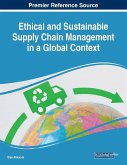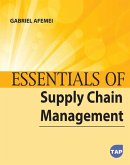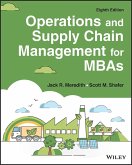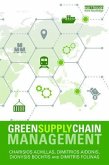Francois Maon, Sankar SenA Research Anthology
Sustainable Value Chain Management
A Research Anthology
Herausgeber: Lindgreen, Adam
Schade – dieser Artikel ist leider ausverkauft. Sobald wir wissen, ob und wann der Artikel wieder verfügbar ist, informieren wir Sie an dieser Stelle.
Francois Maon, Sankar SenA Research Anthology
Sustainable Value Chain Management
A Research Anthology
Herausgeber: Lindgreen, Adam
- Broschiertes Buch
- Merkliste
- Auf die Merkliste
- Bewerten Bewerten
- Teilen
- Produkt teilen
- Produkterinnerung
- Produkterinnerung
The way organizations manage their value chain has changed dramatically over the past decade. Today, organizations take account of economic issues, but they also adopt a broader perspective of their purpose including social and environmental issues. Yet despite its global spread, sustainable value chain management remains an uncertain and poorly de
Andere Kunden interessierten sich auch für
![Ethical and Sustainable Supply Chain Management in a Global Context Ethical and Sustainable Supply Chain Management in a Global Context]() Ethical and Sustainable Supply Chain Management in a Global Context181,99 €
Ethical and Sustainable Supply Chain Management in a Global Context181,99 €![Marketing and Supply Chain Management Marketing and Supply Chain Management]() Dimitris FolinasMarketing and Supply Chain Management68,99 €
Dimitris FolinasMarketing and Supply Chain Management68,99 €![Essentials of Supply Chain Management Essentials of Supply Chain Management]() Gabriel AfemeiEssentials of Supply Chain Management91,99 €
Gabriel AfemeiEssentials of Supply Chain Management91,99 €![Operations and Supply Chain Management for MBAs Operations and Supply Chain Management for MBAs]() Jack R MeredithOperations and Supply Chain Management for MBAs108,99 €
Jack R MeredithOperations and Supply Chain Management for MBAs108,99 €![Production, Operations and Supply Chain Management Production, Operations and Supply Chain Management]() Giuseppe StabiliniProduction, Operations and Supply Chain Management84,99 €
Giuseppe StabiliniProduction, Operations and Supply Chain Management84,99 €![Green Supply Chain Management Green Supply Chain Management]() Charisios AchillasGreen Supply Chain Management58,99 €
Charisios AchillasGreen Supply Chain Management58,99 €![Excellence in Supply Chain Management Excellence in Supply Chain Management]() Balram AvittathurExcellence in Supply Chain Management63,99 €
Balram AvittathurExcellence in Supply Chain Management63,99 €-
-
-
The way organizations manage their value chain has changed dramatically over the past decade. Today, organizations take account of economic issues, but they also adopt a broader perspective of their purpose including social and environmental issues. Yet despite its global spread, sustainable value chain management remains an uncertain and poorly de
Produktdetails
- Produktdetails
- Verlag: Taylor & Francis Ltd
- Seitenzahl: 578
- Erscheinungstermin: 24. Juni 2024
- Englisch
- Abmessung: 246mm x 174mm
- Gewicht: 1065g
- ISBN-13: 9781032836904
- ISBN-10: 1032836903
- Artikelnr.: 70527788
- Herstellerkennzeichnung
- Produktsicherheitsverantwortliche/r
- Europaallee 1
- 36244 Bad Hersfeld
- gpsr@libri.de
- Verlag: Taylor & Francis Ltd
- Seitenzahl: 578
- Erscheinungstermin: 24. Juni 2024
- Englisch
- Abmessung: 246mm x 174mm
- Gewicht: 1065g
- ISBN-13: 9781032836904
- ISBN-10: 1032836903
- Artikelnr.: 70527788
- Herstellerkennzeichnung
- Produktsicherheitsverantwortliche/r
- Europaallee 1
- 36244 Bad Hersfeld
- gpsr@libri.de
Dr Adam Lindgreen is Professor of Marketing at Cardiff Business School, with a Ph.D. from Cranfield University. He is widely published, in academic journals and books including Managing Market Relationships and A Stakeholder Approach to Corporate Social Responsibility. Dr François Maon is Associate Professor of Strategy and Corporate Social Responsibility at the IESEG School of Management, with a Ph.D. from the Louvain School of Management. He is widely published in academic journals and books including A Stakeholder Approach to Corporate Social Responsibility. Dr JoÃ'lle Vanhamme is Professor of Marketing at Edhec Business School with a Ph.D. from the Louvain School of Management. She is widely published in academic journals and books including Memorable Customer Experiences and A Stakeholder Approach to Corporate Social Responsibility. Dr Sankar Sen is Professor of Marketing at Baruch College, City University of New York with a Ph.D. from the Wharton School (University of Pennsylvania). He is widely published in academic journals and books including Leveraging Corporate Responsibility: The Stakeholder Route to Maximizing Business and Social Value.
I: Sustainable Value Chains: Context, Drivers, and Barriers; 1:
Environmental Sustainability in the Supply Chain: A Review of Past
Literature and Discussion of Potential Drivers and Barriers *; 2:
Sustainable Procurement, Institutional Context and Top Management
Commitment: An International Public Sector Study; 3: Environmental Research
and Development, Public Policy, and Value Chain Management: A Competitive
Advantage Perspective; 4: Human Rights in the Value Chain *; 5: The Growth
of Private Regulation of Labor Standards in Global Supply Chains: Mission
Impossible for Western Small and Medium-Sized Firms? *; 6: Supply Chain
Themes in Corporate Social Responsibility Reports *; II: Sustainable Value
Chains: Managing Activities; 7: Aligning Goals and Outcomes in Sustainable
Supply Chain Management; 8: Setting a Framework for Life Cycle Assessment
in Sustainable Technology Development; 9: Creating Socially Responsible and
Environmentally Sustainable IT-Enabled Supply Chains; 10: Social and
Environmental Responsibility, Sustainability, and Human Resource Practices;
11: Using Codes of Conduct to Help SMEs Manage Supply Chains: The Case of
SA8000; 12: Environmental Standards and Certifications in a Value Chain
Perspective: NGOs' View on the Legitimacy of the Process; 13: Applying
Economic Non-Market Valuation for Sustainable Supply Chain Performance
Measurement and Evaluation; III: Sustainable Value Chains: Managing
Networks and Collaboration; 14: Green Offerings and Buyer¿EUR"Supplier
Collaboration in Value Chains; 15: Multi-Stakeholder Initiatives in Cotton
Value Chains: Towards a Theoretical Framework and a Methodology; 16:
Barriers and Facilitators to Developing Sustainable Networks: UK Local and
Regional Food *; 17: Incorporating Impoverished Communities in Sustainable
Supply Chains; 18: Learning to Improve or Deceive? Chinese Supplier
Responses to MNC Codes of Conduct; 19: Understanding Resilience of Complex
Value-Chain Networks; IV: Sustainable Value Chains: Integrative
Perspectives; 20: Ever Expanding Responsibilities: Upstream and Downstream
Corporate Social Responsibility; 21: Meta-Management of Corporate Social
Responsibility; 22: When the Social Movement and Global Value Chain
Literatures Meet: The Case of Fair Trade; V: Sustainable Value Chains:
Specific Sectorial and Industry Perspectives; 23: Contributing to a More
Sustainable Coffee Chain: Projects for Small Farmers Instigated by a
Multinational Company; 24: Corporate Social Responsibility in the Bank
Value Chain; 25: Sustainability in Value Chains: Empirical Evidence from
the Greek Food Sector; 26: Standardizing Sustainability: Certification of
Tanzanian Biofuel Smallholders in a Global Value Chain; 27: Sustainability
in Humanitarian Organisations
Environmental Sustainability in the Supply Chain: A Review of Past
Literature and Discussion of Potential Drivers and Barriers *; 2:
Sustainable Procurement, Institutional Context and Top Management
Commitment: An International Public Sector Study; 3: Environmental Research
and Development, Public Policy, and Value Chain Management: A Competitive
Advantage Perspective; 4: Human Rights in the Value Chain *; 5: The Growth
of Private Regulation of Labor Standards in Global Supply Chains: Mission
Impossible for Western Small and Medium-Sized Firms? *; 6: Supply Chain
Themes in Corporate Social Responsibility Reports *; II: Sustainable Value
Chains: Managing Activities; 7: Aligning Goals and Outcomes in Sustainable
Supply Chain Management; 8: Setting a Framework for Life Cycle Assessment
in Sustainable Technology Development; 9: Creating Socially Responsible and
Environmentally Sustainable IT-Enabled Supply Chains; 10: Social and
Environmental Responsibility, Sustainability, and Human Resource Practices;
11: Using Codes of Conduct to Help SMEs Manage Supply Chains: The Case of
SA8000; 12: Environmental Standards and Certifications in a Value Chain
Perspective: NGOs' View on the Legitimacy of the Process; 13: Applying
Economic Non-Market Valuation for Sustainable Supply Chain Performance
Measurement and Evaluation; III: Sustainable Value Chains: Managing
Networks and Collaboration; 14: Green Offerings and Buyer¿EUR"Supplier
Collaboration in Value Chains; 15: Multi-Stakeholder Initiatives in Cotton
Value Chains: Towards a Theoretical Framework and a Methodology; 16:
Barriers and Facilitators to Developing Sustainable Networks: UK Local and
Regional Food *; 17: Incorporating Impoverished Communities in Sustainable
Supply Chains; 18: Learning to Improve or Deceive? Chinese Supplier
Responses to MNC Codes of Conduct; 19: Understanding Resilience of Complex
Value-Chain Networks; IV: Sustainable Value Chains: Integrative
Perspectives; 20: Ever Expanding Responsibilities: Upstream and Downstream
Corporate Social Responsibility; 21: Meta-Management of Corporate Social
Responsibility; 22: When the Social Movement and Global Value Chain
Literatures Meet: The Case of Fair Trade; V: Sustainable Value Chains:
Specific Sectorial and Industry Perspectives; 23: Contributing to a More
Sustainable Coffee Chain: Projects for Small Farmers Instigated by a
Multinational Company; 24: Corporate Social Responsibility in the Bank
Value Chain; 25: Sustainability in Value Chains: Empirical Evidence from
the Greek Food Sector; 26: Standardizing Sustainability: Certification of
Tanzanian Biofuel Smallholders in a Global Value Chain; 27: Sustainability
in Humanitarian Organisations
I: Sustainable Value Chains: Context, Drivers, and Barriers; 1:
Environmental Sustainability in the Supply Chain: A Review of Past
Literature and Discussion of Potential Drivers and Barriers *; 2:
Sustainable Procurement, Institutional Context and Top Management
Commitment: An International Public Sector Study; 3: Environmental Research
and Development, Public Policy, and Value Chain Management: A Competitive
Advantage Perspective; 4: Human Rights in the Value Chain *; 5: The Growth
of Private Regulation of Labor Standards in Global Supply Chains: Mission
Impossible for Western Small and Medium-Sized Firms? *; 6: Supply Chain
Themes in Corporate Social Responsibility Reports *; II: Sustainable Value
Chains: Managing Activities; 7: Aligning Goals and Outcomes in Sustainable
Supply Chain Management; 8: Setting a Framework for Life Cycle Assessment
in Sustainable Technology Development; 9: Creating Socially Responsible and
Environmentally Sustainable IT-Enabled Supply Chains; 10: Social and
Environmental Responsibility, Sustainability, and Human Resource Practices;
11: Using Codes of Conduct to Help SMEs Manage Supply Chains: The Case of
SA8000; 12: Environmental Standards and Certifications in a Value Chain
Perspective: NGOs' View on the Legitimacy of the Process; 13: Applying
Economic Non-Market Valuation for Sustainable Supply Chain Performance
Measurement and Evaluation; III: Sustainable Value Chains: Managing
Networks and Collaboration; 14: Green Offerings and Buyer¿EUR"Supplier
Collaboration in Value Chains; 15: Multi-Stakeholder Initiatives in Cotton
Value Chains: Towards a Theoretical Framework and a Methodology; 16:
Barriers and Facilitators to Developing Sustainable Networks: UK Local and
Regional Food *; 17: Incorporating Impoverished Communities in Sustainable
Supply Chains; 18: Learning to Improve or Deceive? Chinese Supplier
Responses to MNC Codes of Conduct; 19: Understanding Resilience of Complex
Value-Chain Networks; IV: Sustainable Value Chains: Integrative
Perspectives; 20: Ever Expanding Responsibilities: Upstream and Downstream
Corporate Social Responsibility; 21: Meta-Management of Corporate Social
Responsibility; 22: When the Social Movement and Global Value Chain
Literatures Meet: The Case of Fair Trade; V: Sustainable Value Chains:
Specific Sectorial and Industry Perspectives; 23: Contributing to a More
Sustainable Coffee Chain: Projects for Small Farmers Instigated by a
Multinational Company; 24: Corporate Social Responsibility in the Bank
Value Chain; 25: Sustainability in Value Chains: Empirical Evidence from
the Greek Food Sector; 26: Standardizing Sustainability: Certification of
Tanzanian Biofuel Smallholders in a Global Value Chain; 27: Sustainability
in Humanitarian Organisations
Environmental Sustainability in the Supply Chain: A Review of Past
Literature and Discussion of Potential Drivers and Barriers *; 2:
Sustainable Procurement, Institutional Context and Top Management
Commitment: An International Public Sector Study; 3: Environmental Research
and Development, Public Policy, and Value Chain Management: A Competitive
Advantage Perspective; 4: Human Rights in the Value Chain *; 5: The Growth
of Private Regulation of Labor Standards in Global Supply Chains: Mission
Impossible for Western Small and Medium-Sized Firms? *; 6: Supply Chain
Themes in Corporate Social Responsibility Reports *; II: Sustainable Value
Chains: Managing Activities; 7: Aligning Goals and Outcomes in Sustainable
Supply Chain Management; 8: Setting a Framework for Life Cycle Assessment
in Sustainable Technology Development; 9: Creating Socially Responsible and
Environmentally Sustainable IT-Enabled Supply Chains; 10: Social and
Environmental Responsibility, Sustainability, and Human Resource Practices;
11: Using Codes of Conduct to Help SMEs Manage Supply Chains: The Case of
SA8000; 12: Environmental Standards and Certifications in a Value Chain
Perspective: NGOs' View on the Legitimacy of the Process; 13: Applying
Economic Non-Market Valuation for Sustainable Supply Chain Performance
Measurement and Evaluation; III: Sustainable Value Chains: Managing
Networks and Collaboration; 14: Green Offerings and Buyer¿EUR"Supplier
Collaboration in Value Chains; 15: Multi-Stakeholder Initiatives in Cotton
Value Chains: Towards a Theoretical Framework and a Methodology; 16:
Barriers and Facilitators to Developing Sustainable Networks: UK Local and
Regional Food *; 17: Incorporating Impoverished Communities in Sustainable
Supply Chains; 18: Learning to Improve or Deceive? Chinese Supplier
Responses to MNC Codes of Conduct; 19: Understanding Resilience of Complex
Value-Chain Networks; IV: Sustainable Value Chains: Integrative
Perspectives; 20: Ever Expanding Responsibilities: Upstream and Downstream
Corporate Social Responsibility; 21: Meta-Management of Corporate Social
Responsibility; 22: When the Social Movement and Global Value Chain
Literatures Meet: The Case of Fair Trade; V: Sustainable Value Chains:
Specific Sectorial and Industry Perspectives; 23: Contributing to a More
Sustainable Coffee Chain: Projects for Small Farmers Instigated by a
Multinational Company; 24: Corporate Social Responsibility in the Bank
Value Chain; 25: Sustainability in Value Chains: Empirical Evidence from
the Greek Food Sector; 26: Standardizing Sustainability: Certification of
Tanzanian Biofuel Smallholders in a Global Value Chain; 27: Sustainability
in Humanitarian Organisations








